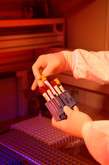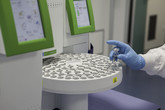Biosimilars/Research
Copy biological approvals in China, compared to the US and EU
A review of copy biological approvals in China finds that 75% of approved monoclonal antibodies, fusion proteins and granulocyte colony-stimulating factor (G-CSF) copy biologicals have been successfully commercialized in the country [1].
Rationale for biosimilar assessment without efficacy trials
An article published in Drug Discovery Today explores the necessity of the clinical efficacy trial in biosimilarity assessments [1].
Shared decision-making and the transition to biosimilars
Increasing healthcare cost are forcing health authorities to look for low-cost innovations to help bend the cost curve. Biosimilars, a biotherapeutic product which is similar in terms of quality, safety and efficacy to an already licensed reference biological, are such an innovation [1]. Because biosimilars are often offered at lower prices, their use has been promoted all across the world. The initiating of biosimilars in bio-naïve patients is already commonplace in many countries. However, the transitioning from originator biological to its biosimilar for non-medical reasons is still debated. Different strategies about how and when to transition are formulated and applied.
Role of efficacy trials in biosimilar assessments questioned
In recent years, the role of the comparative efficacy trial in biosimilar assessments has been brought into question. This is explored in a recent article published by Bielsky and colleagues [1].
Perceptions of biosimilars and switching in Arab rheumatologists
The introduction of biosimilars into the rheumatology field could lead to dramatic cost savings as has been observed in certain European countries. Their implementation and acquisition, however, is not the same across the world. Many rheumatologists have developed a negative perception toward biosimilars and the process of non-medical switching. As important stakeholders, their views and concerns need to be addressed to ensure an effective introduction of these therapeutic agents. Mohammed Omair and colleagues evaluated how Arab rheumatologists perceive biosimilars in view of understanding the manufacturing and approval process during the Arab League Against Rheumatism Conference (ArLAR) [1].
Biosimilar assessments: do we need efficacy trials?
Regulatory guidelines for biosimilar approval have existed in Europe since 2004. These are based on the totality of evidence from comparative studies with reference products and have always required comparative efficacy studies. However, a recent article by Bielsky et al., published in Drug Discovery Today [1], explores the increasingly questioned role of the clinical efficacy trial in biosimilar approval.
Biopharmaceuticals and biosimilars: manufacturing challenges
Biopharmaceuticals include a complex active pharmaceutical ingredient (API). This is manufactured using living systems such as microbial and mammalian cells which makes manufacture a complicated process. A recent paper by Sia et al. published in GaBI Journal [1] has explored current biopharmaceutical processes and the challenges posed by manufacturer.
Biopharmaceuticals and biosimilars: manufacturing processes
The active pharmaceutical ingredient (API) in biopharmaceuticals is manufactured using living systems such as microbial and mammalian cells. Due to this, their manufacture is complex. A recent review by Sia et al. published in GaBI Journal [1] has carried out an in-depth exploration of current biopharmaceutical manufacturing processes.
Pharmacists are key to quality use of medicines for biosimilars
A commissioned review in The Pharmaceutical Journal [1] on interchangeability of biosimilars highlights the pivotal role pharmacists play in the adoption and appropriate use of biosimilars.
Clinical review of biosimilars approved in oncology
As cancer therapeutics constitutes a large proportion of the biologicals market, and patents have begun to expire, biosimilars have an important role in optimizing patient access and reducing costs in the oncology therapeutic area. Authors Ngo and Chen from the City of Hope National Medical Center, Los Angeles, USA, give an overview of the US Food and Drug Administration (FDA)-approved biosimilars in oncology and their impact on the healthcare system in the Annals of Pharmacotherapy [1]. A summary of the main findings from that article follows.













